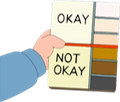Michael Parenti, Blackshirts and Reds: Rational Fascism and the Overthrow of Communism:
The pure (libertarian) socialists’ ideological anticipations remain untainted by existing practice. They do not explain how the manifold functions of a revolutionary society would be organized, how external attack and internal sabotage would be thwarted, how bureaucracy would be avoided, scarce resources allocated, policy differences settled, priorities set, and production and distribution conducted. Instead, they offer vague statements about how the workers themselves will directly own and control the means of production and will arrive at their own solutions through creative struggle. No surprise then that the pure socialists support every revolution except the ones that succeed.
For the still meme confused: Survivorship bias
The country with over 20% of the world’s prison population and a highly militarised police force that routinely carries out extrajudicial killings of ethnic minorities is not ever described as “authoritarian”. Somehow.
At least they managed to become the 24th-least corrupt country…by legalizing all but the most blatantly declared bribes.
Somehow.

Having military bases all around the world is not authoritharian somehow either.
Thr apartide government of the USA noted for the human rights abuses and forced labor
The US runs a system of 40+ slave labor camps, and have over 30k ppl in immigrant prison camps most of whom haven’t committed a crime, but it’s not authoritarian!!!
deleted by creator
Gotta love the whataboutism that pops up any time communism is questioned.
Whataboutism is itself a thought-terminating cliché.
From a logical and argumentative point of view it is considered a variant of the tu-quoque pattern (Latin ‘you too’, term for a counter-accusation), which is a subtype of the ad-hominem argument.
Yes. I’m saying what this article is essentially saying. I’m pointing out the whataboutism. Comment OP isn’t countering the accusations against communism, they are saying well what about America bad.
“Whataboutism or whataboutery (as in “what about…?”) denotes in a pejorative sense a procedure in which a critical question or argument is not answered or discussed, but retorted with a critical counter-question which expresses a counter-accusation”
I think what they were trying to do was deconstruct what you mean by “authoritarian.” What is an authoritarian country? How can we answer if the West is holding AES (Actually Existing Socialist) countries to a double standard if we can’t even define it?
Authoritarian means that they limit what millionaires and billionaires can get away with.
Instead of saying whataboutism, it would be more constructive to say what you think that particular government is doing wrong and what they can do alternatively to accomplish their goal more ethically.
If your own government is doing the same thing, perhaps you should do something about it, because you have more agency to change your own government than some government of another country.
“Muh whata-burger-izuhm!”
I want a Whataburger, but the closest one is like 1500 miles away
Elegant
The Parenti quote itself tackles the “criticism”
We can start regurgitating facts about AES at you if you like. Would you like to start on the Holodomor or Xinjiang lmao
The quote
In the United States, for over a hundred years, the ruling interests tirelessly propagated anticommunism among the populace, until it became more like a religious orthodoxy than a political analysis. During the Cold War, the anticommunist ideological framework could transform any data about existing communist societies into hostile evidence. If the Soviets refused to negotiate a point, they were intransigent and belligerent; if they appeared willing to make concessions, this was but a skillful ploy to put us off our guard. By opposing arms limitations, they would have demonstrated their aggressive intent; but when in fact they supported most armament treaties, it was because they were mendacious and manipulative. If the churches in the USSR were empty, this demonstrated that religion was suppressed; but if the churches were full, this meant the people were rejecting the regime’s atheistic ideology. If the workers went on strike (as happened on infrequent occasions), this was evidence of their alienation from the collectivist system; if they didn’t go on strike, this was because they were intimidated and lacked freedom. A scarcity of consumer goods demonstrated the failure of the economic system; an improvement in consumer supplies meant only that the leaders were attempting to placate a restive population and so maintain a firmer hold over them. If communists in the United States played an important role struggling for the rights of workers, the poor, African-Americans, women, and others, this was only their guileful way of gathering support among disfranchised groups and gaining power for themselves. How one gained power by fighting for the rights of powerless groups was never explained. What we are dealing with is a nonfalsifiable orthodoxy, so assiduously marketed by the ruling interests that it affected people across the entire political spectrum.
– Michael Parenti, Blackshirts And Reds
I am a bot, and this action was performed automatically. Please contact the admins of this instance if you have any questions or concerns.
Obligatory Jakartaposting
This was another very difficult question I had to ask my interview subjects, especially the leftists from Southeast Asia and Latin America. When we would get to discussing the old debates between peaceful and armed revolution; between hardline Marxism and democratic socialism, I would ask:
“Who was right?”
In Guatemala, was it Árbenz or Che who had the right approach? Or in Indonesia, when Mao warned Aidit that the PKI should arm themselves, and they did not? In Chile, was it the young revolutionaries in the MIR who were right in those college debates, or the more disciplined, moderate Chilean Communist Party?
Most of the people I spoke with who were politically involved back then believed fervently in a nonviolent approach, in gradual, peaceful, democratic change. They often had no love for the systems set up by people like Mao. But they knew that their side had lost the debate, because so many of their friends were dead. They often admitted, without hesitation or pleasure, that the hardliners had been right. Aidit’s unarmed party didn’t survive. Allende’s democratic socialism was not allowed, regardless of the détente between the Soviets and Washington.
Looking at it this way, the major losers of the twentieth century were those who believed too sincerely in the existence a liberal international order, those who trusted too much in democracy, or too much in what the United States said it supported, rather than what it really supported—what the rich countries said, rather than what they did. That group was annihilated.
deleted by creator
I would have boosted/crossposted/whatevered your post to here if I knew how to!
federation between glitch-soc and lemmy is kind of borked so like, idk if you even can, so like youre all good
also it was pretty nice to just come across the post i absent mindedly made and find out that like someone thought it was good enough to post here so like youre all good <3
why are people downvoting this?
Perhaps because they take exception to characterizing all of the Actually Existing Socialisms as “authoritarian” in the first place, and I’d agree with them. It leans into “horseshoe theory” and the anticommunist Western Left’s conceptualization of “totalitarianism.”
deleted by creator
Oh yeah I basically just quickly typed it out and posted without really thinking about it that
Because they’re brats with no ability to self reflect and be realistic
Downvoting exists now?
Hexbear and lemmy.blahaj.zone are the only two instances I know that don’t have downvoting enabled. People can still downvote from other instances, but those two instances simply just won’t see those votes.
this bit extends to western marxism too
What is that image?
See the wiki page I linked to: Survivorship bias















